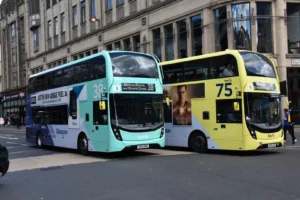The council will take the first steps in exploring public control for Glasgow’s buses, after plans to examine the use of new bus governance powers were approved.
Today’s City Administration Committee agreed proposals to look at alternative ways of running bus services in Glasgow, which could see the council as a transport authority having future control over bus routes, fares and timetables.
The plan to progress business cases for both a franchising scheme and municipally owned bus operations contributes to the delivery of Glasgow’s Transport Strategy, which recognises the importance of bus services in achieving a world-class, integrated public transport system for our city.
The move also lends support to a Clyde Metro as a transformational mass transit system following its emergence as a draft recommendation from the Scottish Government’s second Strategic Transport Projects Review.
Councillor Angus Millar, City Convenor for Transport and Climate, said: “Public transport is a vital part of Glasgow’s sustainable transport future, and we want to explore these new powers to respond locally to challenges and achieve a world-class service for bus passengers in Glasgow.
“Today’s decision marks the start of a process, with a commitment to developing a route map that will explore publicly-controlled services. Before any decisions are taken however, a robust business case for change must be made that evaluates what alternative models of transport delivery would look like.”
“In the interim we will continue to work closely with all partners to improve bus services for Glaswegians and we are open to exploring a time-limited partnership through the Glasgow Bus Partnership which would help unlock more of the £500million committed to Transport Scotland’s Bus Partnership Fund.”
A Bus Service Improvement Partnership (BSIP) could last for up to five years and would formalise partnership arrangements, including those with bus operators, to lock in service standards and advance work already progressing through the Glasgow Bus Partnership to provide safe, affordable connections with improved journey times and increased reliability.
The council will now engage with the Scottish Government and partners to seek funding for the business case work. Subject to funding being secured and the introduction of secondary legislation that will enable bus franchising, business case development for options on changes to bus governance could start in 2023/24.
Decisions around the best form of governance will likely fall within the current council term, with additional capital and revenue funding from the Scottish Government required to make any changes feasible.
Updates on business case development will come back to committee, as will progress reports on exploratory discussions regarding a BSIP, with any decision to initiate a formalised partnership requiring City Administration Committee approval.
























